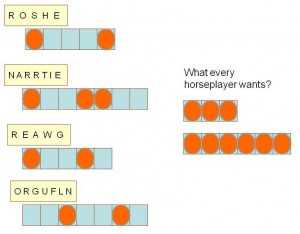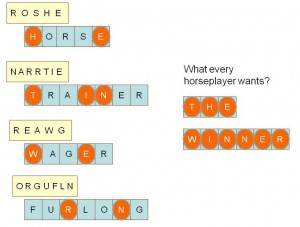Crossword or Jumble – Different Horseplaying Styles
If you check the puzzle section of the newspaper you’re likely to find these two types of puzzles. Many horseplayers can be divided into these two broad categories. One is not necessarily better than the other, but understanding the Pros and Cons of both might help you decide which one fits your style.
A crossword player isn’t finished until they’ve finished filling in all of the words in the puzzle. A “crossword horseplayer” likes to evaluate all of the horses and angles before making his selections in a race. He sizes up every horse in categories of distance, class, pace, and form. He looks at result charts and watches video replays. Depending on the type of race he might sprinkle in some trainer statistics, age angles, jockey changes, etc. This describes me, I’m a “crossword horseplayer.”
A jumble player considers the clue (e.g. What every horseplayer wants?) to the puzzle first, and then starts unscrambling the words. He might have to unscramble all the words before solving the puzzle, or only a couple before the answer becomes obvious to him. A “jumble horseplayer” looks for clues in each race, searching for tried and proven angles, and frequently identifies “the solution” before unscrambling all of the parts. This describes my wife, Deb, a “jumble horseplayer.”
In a recent day of racing, I was alive to three horses in the third leg of a Pick-3. Five minutes before post time, Deb asked me, “Do you have #8 covered?” I replied, “No, why?” She said, “He showed some early speed in his last race off a layoff (one of her favorite angles) and he’s on his toes today.” I looked at the odds board and he was 19-1. I was suspect of the added distance he was taking on, but then I looked back at my pace notes and realized there weren’t many horses with early speed in today’s race. This horse could wire the field if left alone on the front end. Well, you guessed it, the jumble player was right! While my Pick-3 ticket went down in flames, 19-1 was a good consolation for a Saver ticket.
The jumble player usually requires less time to prepare for each race. And, when the winner can be gleaned from a couple of unscrambled clues, the jumble player is rewarded. The crossword player needs more time to ready himself for a day of racing. But, when the winner(s) are visible through the prism of a holistic review, the crossword horseplayer is rewarded.
So, which way is best? It really depends on the individual. How much time (and patience) do you have to prepare? Do you have enough reliable “angles” to identify when searching for clues? While horse racing can be a complicated sport to learn, it doesn’t have to be a complicated game to play. After you learn the fundamentals, tailor your own handicapping style to the puzzle type that fits you.
Even if you’re limited on time, you can be a crossword horseplayer. There’s no law that says you have to play every race. Play less races. That’s exactly what my son does. He refuses to look at certain types of races (e.g. 2-year old maiden races). On a typical 10-race card, he will usually handicap only 5-7 races. In another example, a friend of mine arrives at the racetrack around the 4th or 5th race, and limits his handicapping to the last five or six races.
Whether you’re inclined to be a crossword or jumble player, you can be effective with either style as a horseplayer.



4 comments on “Crossword or Jumble – Different Horseplaying Styles”